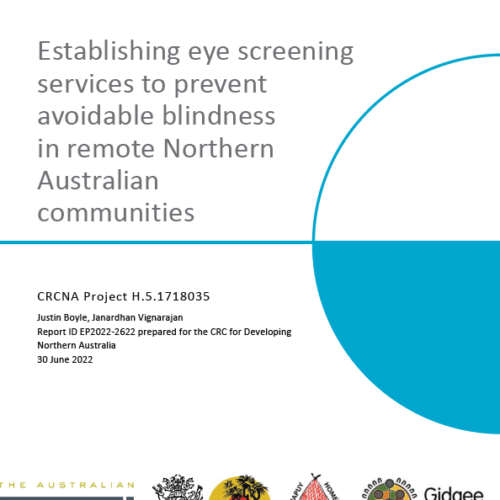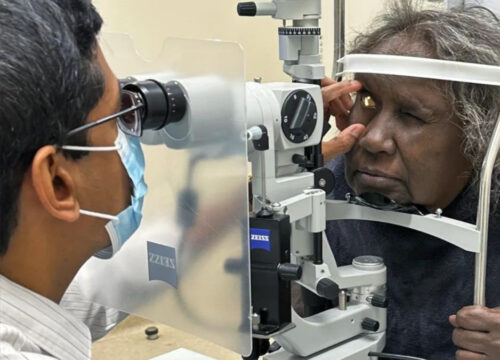
- Author Boyle, J., Vignarajan, J
- Publish date 29 September 2022
- Type Report
- Documents
- Health service delivery
Summary
In July 2018, CSIRO along with its project partners Queensland Health, Laynhapuy Homelands Aboriginal Corporation, Marthakal Homeland and Resource Centre Aboriginal Corporation, Gidgee Healing and NT Eye Specialists commenced a multi-year project to establish telehealth-based eye screening services to prevent avoidable blindness in remote northern Australian communities.
The primary outcome sought from this project was a working sustainable teleophthalmology service, to continue serving the communities after project completion. This outcome has been achieved, and a secure telehealth service now connects metropolitan-based ophthalmologists to patients in several regional and remote communities in Northern Territory and Queensland. The telehealth platform incorporates AI-based image quality and disease detection algorithms to complement and support decisions of eye health assessment teams. This service helps in closing the gap in access to eye care services for people living in under-served rural and remote communities, preventing needless blindness.
A valuable screening service has been established in the target areas, evidenced by the following outcomes realised by the project:
- improved access to ophthalmic health services for residents of the project screening locations, thereby closing the gap in providing specialist eye care to the rural and remote communities;
- demonstration that routine eye examination (instead of opportunistic eye examination) is feasible for early detection of some eye diseases for remote and rural patients;
- cost savings relating to reduced patient travel to metropolitan areas and/or prioritising patients by need for a consultant’s visit to their locality, hence increasing efficiency and maximising resource use;
- improved health outcomes by earlier identification of diseases, enabling not only vision saving treatment but reduced consumption of scarce health resources;
- capacity building of Northern Australian healthcare workers to perform eye screening and obtain new knowledge about eye diseases; and
- improved patient health awareness where the retinal camera is used as an educational tool.
Projects
Establishing eye screening services to prevent avoidable blindness in remote Northern Australian communities
A new eye screening service and delivery model will enhance the effectiveness of remote health service delivery, optimise health spending and ‘reduce the gap’ in health outcomes for people in remote areas, particularly for those at risk of blindness from underlying conditions, like diabetes. This project will implement retinal screening using a telehealth platform developed by CSIRO, where health workers will be trained to use retinal cameras to take photos of patients’ eyes in remote communities. Ophthalmologist teams based in larger regional centres, will access this information via web-based technologies and provide review and diagnostic services. The lessons learned from this research will be used to develop a new and innovative model of care for the delivery of remote health services, which will be applicable to broader health initiatives in remote communities.


